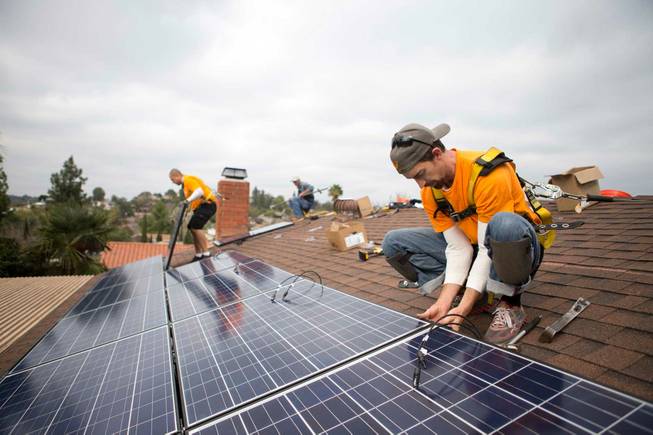
COURTESY
In this file photo, Vivint Solar employees install solar panels on a home.
Published Tuesday, May 24, 2016 | 4:35 p.m.
Updated Thursday, May 26, 2016 | 12:06 p.m.
Adding data to a contentious debate over the value of rooftop solar in Nevada, SolarCity released a report today showing the benefits of rooftop solar outweigh the costs for all ratepayers.
Conducted with the Natural Resources Defense Council, it finds all ratepayers — regardless if they have rooftop solar panels — should benefit from the technology.
The benefits include adding energy supply to NV Energy’s network and reducing the cost of investments in the grid. The report found such benefits outbalance the costs of solar, which largely stem from less money going toward the utility’s fixed costs.
NV Energy and the Nevada Public Utilities Commission, which approved less favorable rates for rooftop solar customers in December, have relied on a cost study showing the opposite is true.
That data, from a marginal cost of service study, has been criticized by several groups, including the state’s consumer advocate.
“What this study does is fills in the blanks for the things that the (commission) didn’t have data for,” Tim Hay, a former Nevada regulator and consumer advocate, said at an editorial board meeting with the Las Vegas Sun.
The report finds rooftop solar, as it stands now, would offer all ratepayers a net benefit of $7 million a year and roughly $76 million over the life of the rooftop solar panels.
When the additional environmental benefits of rooftop solar are factored in, those benefits are roughly doubled.
How rooftop solar customers should be reimbursed and treated by the utility remains a subject of fierce debate in Nevada.
Most solar users now face higher bills because of changes in the rate structure that tripled a fixed fee and slashed the value of credits solar customers earn for selling excess energy under a program known as net metering.
NV Energy is fighting to keep the new rules while, SolarCity, which ceased sales in the state, is fighting to reverse them.
NV Energy spokeswoman Jennifer Schuricht said the company was reviewing the study and “it is too early to comment on the content.”
“We feel strongly that no additional public policy mandates are needed to incentivize or subsidize future adoption of rooftop solar,” Schuricht said via email. “In addition, we know that customers who install rooftop solar rely on the power grid 24 hours per day, seven days a week. These customers should pay their fair share for that grid service, and not shift costs to those customers who don’t have rooftop solar.”
SolarCity’s report, introduced at a conference of utility regulators Monday and to the public at a UNLV panel today, was peer-reviewed by academics at Stanford University. It relies on a model developed by Nevada utility regulators as part of a report they commissioned in 2014.
That report, known as the E3 study, also showed the benefits of rooftop solar outweighed the costs, given market assumptions at the time.
But the Public Utilities Commission largely dismissed the study as it set the new rates because the E3 study relied on pricing data it considered out of date.
SolarCity and the Natural Resources Defense Council argue that their report provides an update, as both organizations hope to see the prior solar rate structure restored. And the PUC appears open to considering it in future cases.
“The (commission) encourages the rooftop solar industry to present any new analysis or studies in upcoming rate cases, where the value of rooftop solar will be re-examined for the purpose of updating net-metering rates,” spokesperson Peter Kostes wrote in an email.
Regardless, he said, the commission would also consider the benefits of rooftop solar in a resource-planning proceeding for NV Energy’s Northern Nevada subsidiary. That proceeding is slated to begin this summer.
There are roughly 23,000 homes with rooftop solar in Nevada.
In addition to providing a cost-benefit analysis, SolarCity and the council called for regulatory changes, arguing current models for grid planning and incentivizing utilities are barriers to rooftop solar.
Earlier this year, SolarCity hired former Federal Energy Regulatory Commission Chairman Jon Wellinghoff to direct its policy team. As Nevada’s first consumer advocate and a former general counsel to the commission, he has experience with energy policy in Nevada.
“We should have competitive markets that provide choice for consumers,” Wellinghoff said during the Sun editorial board meeting this morning. “If they want to buy clean energy, they should have that choice.”
The SolarCity report coincided with the release of a Brookings Institution meta-analysis of rooftop solar studies conducted nationwide. It largely concludes rooftop solar net metering is an overall benefit.
CORRECTION: This story has been updated to correct the name of the Natural Resources Defense Council. | (May 26, 2016)

Join the Discussion:
Check this out for a full explanation of our conversion to the LiveFyre commenting system and instructions on how to sign up for an account.
Full comments policy